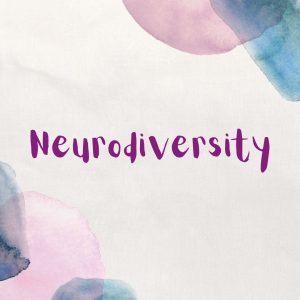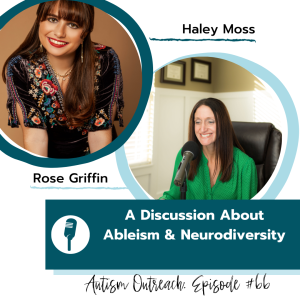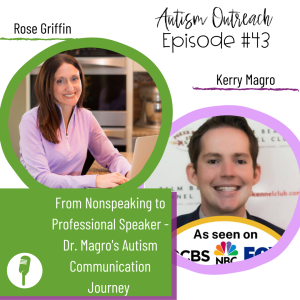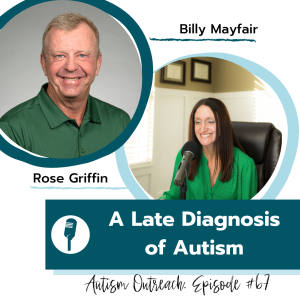Neurodiversity is a beautiful term to describe a brain that just works differently! Speech therapy is often a service for neurodiverse individuals including those that have autism. In speech therapy working with neurodiversity is a challenge at times, but is so rewarding to watch individuals grow in their communication. Talking with neurodiverse individuals really helps us understand how to be empathetic, understanding, and plan efficiently for our students to help them grow!

What is Neurodiversity?
Neurodiversity is when a person’s brain works differently in terms of cognition. Another way of thinking about neurodiversity is thinking about a person’s brain working in an “out of the box” way. Brains that work outside of the “expected” norm are considered neurodivergent. People with neurodivergent brains may have autism, ADHD, mental health problems, intellectual disabilities, or result from traumatic brain injury or even illness.
Neurodiversity in Speech Therapy: Goals
Our ultimate goal as providers is to help. Remember when we know what is happening in a neurodivergent brain or how learning is happening for that individual child or person, it becomes much easier to support the needs of the student. Also, when it comes to behavior, it is important to know that behavior happens for a reason and keeping in mind the whole person will be vital to better working through behaviors, learning from them, and learning how to cope with them. Lastly, don’t be afraid to share goals. What are the supports, or needs of each individual? Of course they will change over time, but as individuals get older, they can advocate for themselves, if they understand what services are needed to continue to grow!
Autism Outreach Podcasts with Autistic Adults
It is so important to talk with adults with autism to learn from them. Who better to learn from than individuals with autism? Their voices are so important! I have recently had the pleasure to interview several autistic adults on my podcast and to say it is enlightening is an understatement. I have learned so much from speaking with individuals on the podcast and am excited to be able to share this knowledge with all of you!
Meet Haley Moss
On my Autism Outreach Podcast I had the pleasure of interviewing Haley Moss about her experiences as an autistic adult. Haley is an author, lawyer, educator, speaker, and is also autistic. We chatted about inclusivity in therapy and society. Some of the big takeaways from my interview with Haley is that she compares neurodivergent social skills to being bilingual. She compares the social skills of neurotypical individuals with people that are bilingual because neurotypical individuals will always come out with an “autistic accent.” Haley also emphasizes the importance of expanding or teaching the reasoning behind social skills, as cultural needs, instead of describing them as the norm. When we use trust and understanding of how and why people interact, it helps neurotypical individuals to better understand social skills. This one is pretty interesting; click here to listen to the full podcast.

Meet Dr. Kerry Magro
Dr. Kerry Magro is a very special individual that shares his story openly today. Dr. Magro is an award-winning, autistic, professional speaker, best selling author, and autism consultant to the HBO series Mrs. Fletcher. Dr. Magro was non-speaking at 2.5 years old, diagnosed with autism at 4 years old, and didn’t speak full sentences until he was 7 years old. Dr. Magro describes the two biggest things that helped him grow from non-speaking to a professional speaker were speech therapy and music therapy. He also says with the right support anyone can achieve! Dr. Magro shares his story about learning about his diagnosis as a child, and advocating for himself as he ventured to college and beyond. Listen to the full podcast here!

Meet Billy Mayfair
Billy Mayfair is a wonderful neurodivergent individual and he is also a top professional golfer in the United States! Billy did not find out his diagnosis until late in life, in 2019. In the podcast Billy shares details of his early life and his struggles in school. He also shares the concerns that led to his evaluation, and how those answers have helped him find the support he needed. One of the biggest struggles Billy has is a thought delay that presents as an unpleasant look on his face. Due to his diagnosis being late in life as an adult, when he was already a professional golfer, Billy had to adapt to using supports including seeing a neuropsychologist and even a nutritionist who is helping him understand how his diet affects his brain. Interested in hearing more? Listen to the entire podcast here!

Speech therapy can be a huge game changer for neurodiverse individuals, especially those with autism. Understanding how important it is to listen and learn from those adults that are now sharing their stories of struggle and success and give so much insight into best practices and needs of individuals in speech therapy. Showing empathy and understanding makes all the difference in our practice. Neurodiversity and speech therapy will always go hand in hand!

0 Comments